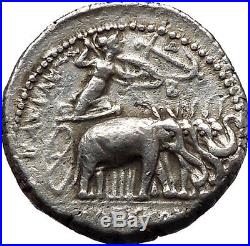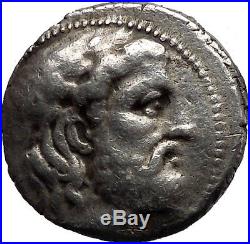


Greek Coin of Seleucid Kingdom. King: 312-280 B. Silver Tetradrachm 26mm (17.27 grams) Struck circa 312-280 B. Reference: Sear 6831 var. HGC 9, 18 Laureate head of Zeus. Athena, brandishing spear and holding shield, standing in chariot drawn right by four horned elephants; on left, ; in exergue, EYKOY. Destined to be the longest-surviving of the’Successors’ of Alexander, Seleukos had a difficult time establishing his power. Alloted the satrapy of Babylon in 321 B. He was ousted from this position five years later, by Antigonos the One-eyed, and fled to his friend Ptolemy in Egypt. He regained Babylon and it is from this even that the Seleukid Era is dated. Seleukos gradually consolidated his power and in 305 B. Took the title of King. From 305-3 he campaigned in the east, extending his rule as far as India. With his defeat of Lysimachos in 281 he became master of the whole of Alexander’s empire, except Egypt; but the following year he was assassinated by Ptolemy Keraunos, a renegade son of his late friend, the King of Egypt. The territorial extent of this might realm varied greatly from period to period. At its zenith, under Seleukos I and Antiochos I, it compromised almost the whole of Alexander’s conquests, except Egypt. In the mid-3rd century the easternmost provinces were lost when both Baktria and Parthia achieved independence. Antiochos III, the Great, attempted to regain the lost territories, but he was only partially successful and in 190 B. He was defeated by the Romans at the battle of Magnesia. This destroyed the Seleukid power in Asia Minor, their former possessions passed to Rome’s ally, the Kingdom of Pergamon. The Seleukid Kingdom, now restricted to Syria and the surrounding area, maintained a precarious existence until 64 B. When it finally succumbed to Pompey the Great. Was the “Father of Gods and men”. Who ruled the Olympians of. As a father ruled the family. Zeus was the child of. And the youngest of his siblings. In most traditions he was married to. Although, at the oracle of. He is the father of. He is known for his erotic escapades. These resulted in many godly and heroic offspring, including. ; by Hera, he is usually said to have fathered. Points out in his book, Greek Religion , Even the gods who are not his natural children address him as Father, and all the gods rise in his presence. For the Greeks, he was the. King of the Gods. Who oversaw the universe. Observed, “That Zeus is king in heaven is a saying common to all men”. Zeus assigns the various gods their roles. In the Homeric Hymns. His symbols are the. In addition to his Indo-European inheritance, the classical “cloud-gatherer” also derives certain iconographic traits from the cultures of the. Zeus is frequently depicted by Greek artists in one of two poses: standing, striding forward, with a thunderbolt leveled in his raised right hand, or seated in majesty. , also referred to as Pallas Athena , is the goddess of war, civilization, wisdom, strength, strategy, crafts, justice and skill in. Incarnation, embodies similar attributes. Athena is also a shrewd companion of. The Athenians built the. On the Acropolis of her namesake city, Athens, in her honour (Athena Parthenos). Athena’s cult as the patron of Athens seems to have existed from the earliest times and was so persistent that archaic myths about her were recast to adapt to cultural changes. In her role as a protector of the city. , many people throughout the Greek world worshiped Athena as Athena Polias (“Athena of the city”). And Athena bear etymologically connected names. 358 BC 281 BC. Was one of the Diadochi. Having previously served as an infantry general under Alexander the Great. He eventually assumed the title of basileus. And established the Seleucid Empire. Over much of Alexander’s near eastern. After the death of Alexander, Seleucus initially supported Perdiccas. The regent of Alexander’s empire, and was appointed Commander of the Companions. At the Partition of Babylon. However, at the outbreak of the Wars of the Diadochi. Perdiccas’ military failures against Ptolemy. Led to the mutiny of his troops in Pelusium. Perdiccas was betrayed and assassinated in a conspiracy by Seleucus, Peithon. In Pelusium sometime in either 321 or 320 BC. At the Partition of Triparadisus. Seleucus was appointed Satrap of Babylon. Under the new regent Antipater. But almost immedialty, the wars between the Diadochi resumed and Antigonus. Forced Seleucus to flee Babylon. Seleucus was only able to return to Babylon in 312 BC with the support of Ptolemy. From 312 BC, Seleucus ruthlessly expanded his dominions and eventually conquered the Persian. Seleucus did not only rule Babylonia. But the entire enormous eastern part of Alexander’s empire.

